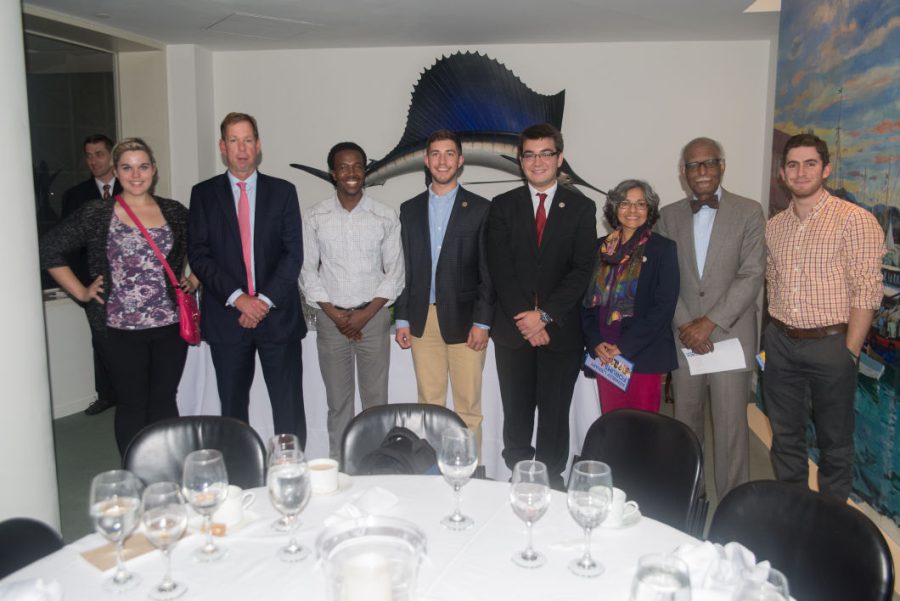On Sept. 30, the Honors College held a dinner in the John F. Kennedy Library, where Boston Globe Editor Brian McGrory was the featured speaker. Over pasta, meatballs, and brownies, attendees talked, networked, and engaged McGrory with questions when it came time for him to speak.
Brian McGrory is a best-selling author of the book “Buddy: How a Rooster Made Me a Family Man.” He has over two decades of experience as a journalist, and was once the Globe’s White House correspondent. In the spring of 2012 McGrory became its editor.
At the dinner, he talked about his experiences, both the past and the future of his publication, and his book.
“The Globe can’t be a daily dentist drill. What I am trying to do is reflect the entire community. There are good things happening in this region. There are really interesting things that happen.”
Tom Putman, the Director of the JFK Library posed the first question, asking McGrory if he had any advice for aspiring journalists.
McGrory replied that it’s important to consider when breaking news that might put someone in an unfavorable light, whether or not that news is “for the greater good”.
“In many situations it’s extremely uncomfortable. We are holding people accountable. And often it’s just good people who do one wrong thing.”
One questioner wondered if this approach may have cut down politicians and leaders who have the capacity to make a positive impact, but never get the chance to.
“A person’s character is ultimately the best measure of how they will perform under pressure. We hone in on the character to a certain degree, and I do believe it helps the public decide.”
When asked how the Globe competes with citizen journalists and WordPress blogs, McGrory said “In an incredibly crowded media environment in which everyone is a make-pretend reporter throwing suppositions out as fact, rather than bend to that, it actually enhances our value.”
“If we maintain the standards at the Boston Globe, we believe we can actually rise above the cacophony and people will turn to us.”
McGory recounted when “the Globe printed money”, how one Sunday issue literally weighed ten pounds, and acknowledged the adjustments imposed by the digital era, the most detrimental being the loss of classified ads. He lamented the lack of funding for foreign correspondence.
“Buddy: How a Rooster Made Me a Family Man”, is the autobiographical story of a bachelor removed from the city out of love for his new wife, and into a suburban house with two daughters and a selectively-loyal rooster, whom he frequently vests for power with.
“The rooster didn’t understand the point of me. If he was there, I was needless.”
Ultimately, both the conflict with the rooster and the bird’s values become the inspiration for the man to accept his changed life and fill the role needed of him.
Sociology Major and Honor’s College student, Sarah Bolden, said “Brian McGrory touched on a number of pressing issues that the media sometimes refrain from addressing. He was up-front and, at times, blunt, making it clear that he respects the audience that he is publishing material for.”
“I sometimes become very disillusioned with the U.S. media, questioning its ability to remain critical of its motives and keep its biases in check.”
“Essentially, my biggest takeaway was realizing that not every media source is wholly motivated by greed; I feel more hopeful.”
The dinner began with everyone introducing themselves, making apparent the eclectic mix of careers, focuses, and individuals. Provost Winston Langley joked that he was “basking” in the collaboration of the event.
Graduate student at the McCormack School for Global Policy, Parfait Gasana, said “It’s very important for a university to get students involved beyond the classroom with people who have already achieved a lot in their lives.”
“Usually you read about someone in the Boston Globe, but you can’t really put a face to it. That person is right in front of you and it shows you the possibilities that you can do.
Dean of the Honor’s College, Rajini Srikanth, spoke about how bringing together seemingly disparate subjects was a key aspect of the Honor’s College.
“We discussed a number of the social, economic, and political impacts of the media. The Honors College was wonderfully represented at this even,” said Borden.

